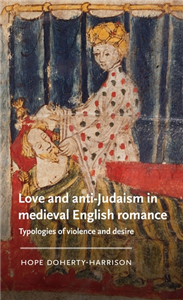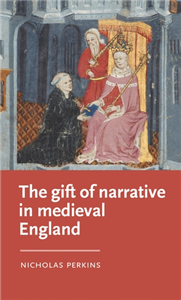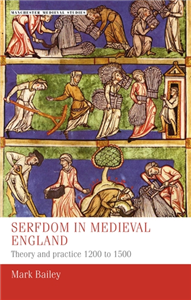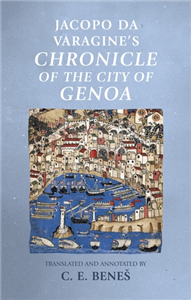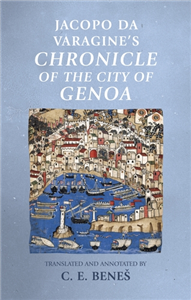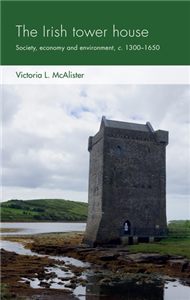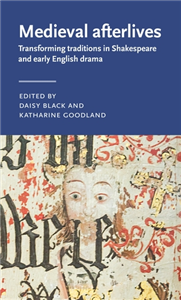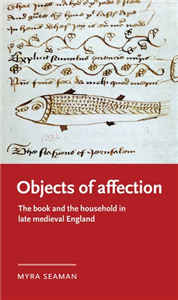Your Search Results
-
Promoted ContentLiterature & Literary StudiesSeptember 2025
Love and anti-Judaism in medieval English romance
Typologies of violence and desire
by Hope Doherty-Harrison
Love and anti-Judaism is a new examination of medieval romance for the questions it poses of the most significant events in Christian history. Providing new readings of Sir Gawain and the Green Knight, Sir Orfeo, Sir Gowther and Sir Amadace, the book argues that romance explores depictions of love-and the sacrifices it may necessitate-in the Hebrew Bible, especially where they do not easily fit into interpretations asserting that this history must prefigure Christ and the crucifixion. An examination of anti-Judaism as a discourse of violence and desire that could be turned inwardly to expose the irresolution in Christianity, this book will provoke new investigations into the religious crises of medieval romance.
-
Promoted ContentLiterature & Literary StudiesJanuary 2023
The gift of narrative in medieval England
by Nicholas Perkins
This invigorating study places medieval romance narrative in dialogue with theories and practices of gift and exchange, opening new approaches to questions of storytelling, agency, gender and materiality in some of the most engaging literature from the Middle Ages. It argues that the dynamics of the gift are powerfully at work in romances: through exchanges of objects and people; repeated patterns of love, loyalty and revenge; promises made or broken; and the complex effects that time works on such objects, exchanges and promises. Ranging from the twelfth century to the fifteenth, and including close discussions of poetry by Chaucer, the Gawain-Poet and romances in the Auchinleck Manuscript, this book will prompt new ideas and debate amongst students and scholars of medieval literature, as well as anyone curious about the pleasures that romance narratives bring.
-
 Trusted Partner
Humanities & Social SciencesNovember 2025
Trusted Partner
Humanities & Social SciencesNovember 2025Serfdom in medieval England
Theory and practice 1200 to 1500
by Mark Bailey
Serfdom was a coercive relationship between a landowner and peasant, which was widespread across medieval and early modern Europe. Itfeatures prominently in major historical debates, such as the origins of capitalism and the divergent pathways of western and eastern Europe to modernity. Scholars have paid particular attention to English serfdom, which is usually portrayed as highly oppressive and a major cause of the Peasants' Revolt in 1381. This comprehensive survey draws on a vast scholarship and new research to show how, in reality, English serfdom was weak, casting new light on the nature of its society and economy when the Black Death struck in 1348-9. The pandemicnow assumesa central role in the rapid decline of serfdom, as illustrated in a case study of the estate of one of England's harshest landowners, St Albans abbey.
-
 Trusted Partner
Humanities & Social SciencesJanuary 2017
Trusted Partner
Humanities & Social SciencesJanuary 2017Heresy and inquisition in France, 1200–1300
by John H. Arnold, Peter Biller
Heresy and inquisition in France, 1200-1300 is an invaluable collection of primary sources in translation, aimed at students and academics alike. It provides a wide array of materials on both heresy (Cathars and Waldensians) and the persecution of heresy in medieval France. The book is divided into eight sections, each devoted to a different genre of source material. It contains substantial material pertaining to the setting up and practice of inquisitions into heretical wickedness, and a large number of translations from the registers of inquisition trials. Each source is introduced fully and is accompanied by references to useful modern commentaries. The study of heresy and inquisition has always aroused considerable scholarly debate; with this book, students and scholars can form their own interpretations of the key issues, from the texts written in the period itself.
-
 Trusted Partner
Humanities & Social SciencesJuly 2022
Trusted Partner
Humanities & Social SciencesJuly 2022Jacopo da Varagine's Chronicle of the city of Genoa
by C. E. Beneš
This book offers the first English translation of the Chronicle of the city of Genoa by the thirteenth-century Dominican Jacopo da Varagine, an author best known for his monumental book of saints' lives, the Golden legend. Jacopo's Chronicle presents a coherent vision of Genoa's place in history, the cosmos and Creation as written by the city's own archbishop - mixing eyewitness accounts with scholarly research about the city's origins and didactic reflections on the proper conduct of public and private life. Accompanied by an extensive introduction, this complete translation provides a unique perspective on a dynamic medieval city-state from one of its most important officials, broadening the available literature in English on medieval Italian urban life.
-
 Trusted Partner
Humanities & Social SciencesNovember 2019
Trusted Partner
Humanities & Social SciencesNovember 2019Jacopo da Varagine's Chronicle of the city of Genoa
by C. E. Beneš, Rosemary Horrox
This book offers the first English translation of the Chronicle of the city of Genoa by the thirteenth-century Dominican Jacopo da Varagine, an author best known for his monumental book of saints' lives, the Golden legend. Jacopo's Chronicle presents a coherent vision of Genoa's place in history, the cosmos and Creation as written by the city's own archbishop - mixing eyewitness accounts with scholarly research about the city's origins and didactic reflections on the proper conduct of public and private life. Accompanied by an extensive introduction, this complete translation provides a unique perspective on a dynamic medieval city-state from one of its most important officials, broadening the available literature in English on medieval Italian urban life.
-
 Trusted Partner
Humanities & Social SciencesNovember 2019
Trusted Partner
Humanities & Social SciencesNovember 2019Jacopo da Varagine's Chronicle of the city of Genoa
by Carrie Beneš, Rosemary Horrox
This book offers the first English translation of the Chronicle of the city of Genoa by the thirteenth-century Dominican Jacopo da Varagine, an author best known for his monumental book of saints' lives, the Golden legend. Jacopo's Chronicle presents a coherent vision of Genoa's place in history, the cosmos and Creation as written by the city's own archbishop - mixing eyewitness accounts with scholarly research about the city's origins and didactic reflections on the proper conduct of public and private life. Accompanied by an extensive introduction, this complete translation provides a unique perspective on a dynamic medieval city-state from one of its most important officials, broadening the available literature in English on medieval Italian urban life.
-
 Trusted Partner
Humanities & Social SciencesApril 2021
Trusted Partner
Humanities & Social SciencesApril 2021The Irish tower house
Society, economy and environment, c. 1300–1650
by Victoria L. McAlister
The Irish tower house examines the social role of castles in late-medieval and early modern Ireland. It uses a multidisciplinary methodology to uncover the lived experience of this historic culture, demonstrating the interconnectedness of society, economics and the environment. Of particular interest is the revelation of how concerned pre-modern people were with participation in the economy and the exploitation of the natural environment for economic gain. Material culture can shed light on how individuals shaped spaces around themselves, and tower houses, thanks to their pervasiveness in medieval and modern landscapes, represent a unique resource. Castles are the definitive building of the European Middle Ages, meaning that this book will be of great interest to scholars of both history and archaeology.
-
 Trusted Partner
Literature & Literary StudiesJanuary 2013
Trusted Partner
Literature & Literary StudiesJanuary 2013Popular protest in late-medieval Europe
Italy, France and Flanders
by Samuel Kline Cohn
The documents in this stimulating volume span from 1245 to 1424 but focus on the 'contagion of rebellion' from 1355 to 1382 that followed in the wake of the plague. They comprise a diversity of sources and cover a variety of forms of popular protest in different social, political and economic settings. Their authors range across a wide political and intellectual horizon and include revolutionaries, the artistocracy, merchants and representatives from the church. They tell gripping and often gruesome stories of personal and collective violence, anguish, anger, terror, bravery, and foolishness. Of over 200 documents presented here, most have been translated into English for the first time, providing students and scholars with a new opportunity to compare social movements across Europe over two centuries, allowing a re-evaluation of pre-industrial revolts, the Black Death and its consequences for political culture and action. This book will be essential reading for those seeking to better understand popular attitudes and protest in medieval Europe.
-
 Trusted Partner
The ArtsJanuary 2019
Trusted Partner
The ArtsJanuary 2019Medieval film
by Anke Bernau, Bettina Bildhauer
Medieval film explores theoretical questions about the ideological, artistic, emotional and financial investments inhering in cinematic renditions of the medieval period. What does it mean to create and watch a 'medieval film'? What is a medieval film and why are they successful? This is the first work that attempts to answer these questions, drawing, for instance, on film theory, postcolonial theory, cultural studies and the growing body of work on medievalism. Contributors investigate British, German, Italian, Australian, French, Swedish and American film, exploring topics such translation, temporality, film noir, framing and period film - and find the medieval lurking in unexpected corners. In addition it provides in-depth studies of individual films from different countries including The Birth of a Nation to Nosferatu, and Robin Hood: Prince of Thieves. Medieval film will be of interest to medievalists working in disciplines including literature, history, art history, to scholars working on film and in cultural studies. It will also be of interest to undergraduates, postgraduates and to an informed enthusiast in film or/and medieval culture.
-
 Trusted Partner
Literature & Literary StudiesOctober 2010
Trusted Partner
Literature & Literary StudiesOctober 2010Sanctity and pornography in medieval culture
On the verge
by Bill Burgwinkle, Cary Howie, Anke Bernau
Sanctity and pornography in medieval culture exposes the complexity of bodily exposure in medieval devotion and contemporary pornographic cultures. Through readings of texts and images, sacred and profane, from preimodern France and Italy as well as Anglo-American modernity, the book makes a case for paying closer attention to the surfaces of our bodies and the desires that those surfaces can articulate and arouse. From the Old French life of Saint Alexis to the work of writer-filmmaker Miranda July, from Wakefield Poole to Pietro Aretino, these are texts and images that diminish the distance between premodern Europe and contemporary California, between the sacred and the profane, as they demonstrate how, in the end as in the beginning, the surface of things is never simple. ;
-
 Trusted Partner
The ArtsJune 2021
Trusted Partner
The ArtsJune 2021Medieval film
by Anke Bernau, Bettina Bildhauer
Medieval film explores theoretical questions about the ideological, artistic, emotional and financial investments inhering in cinematic renditions of the medieval period. What does it mean to create and watch a 'medieval film'? What is a medieval film and why are they successful? This is the first work that attempts to answer these questions, drawing, for instance, on film theory, postcolonial theory, cultural studies and the growing body of work on medievalism. Contributors investigate British, German, Italian, Australian, French, Swedish and American film, exploring topics such translation, temporality, film noir, framing and period film - and find the medieval lurking in inexpected corners. In addition it provides in-depth studies of individual films from different countries including The Birth of a Nation to Nosferatu, and Robin Hood: Prince of Thieves. Medieval Film will be of interest to medievalists working in disciplines including literature, history, to scholars working on film and in cultural studies. It will also be of interest to undergraduates, postgraduates and to an informed enthusiast in film or/and medieval culture.
-
 Trusted Partner
Literature & Literary StudiesMay 2024
Trusted Partner
Literature & Literary StudiesMay 2024Medieval afterlives
Transforming traditions in Shakespeare and early English drama
by Daisy Black, Katharine Goodland
A collection of essays which show how early drama traditions were transformed, recycled, re-used and reformed across time to form new relationships with their audiences. Medieval afterlives brings new insight to the ways in which peoples in the sixteenth century understood, manipulated and responded to the history of their performance spaces, stage technologies, characterisation and popular dramatic tropes. In doing so, this volume advocates for a new understanding of sixteenth-seventeenth century theatre makers as highly aware of the medieval traditions that formed their performance practices, and audiences who recognised and appreciated the recycling of these practices between plays.
-
 Trusted Partner
Literature & Literary StudiesJanuary 2023
Trusted Partner
Literature & Literary StudiesJanuary 2023Objects of affection
The book and the household in late medieval England
by Myra Seaman
Objects of affection recovers the emotional attraction of the medieval book through an engagement with a fifteenth-century literary collection known as Oxford, Bodleian Library Manuscript Ashmole 61. Exploring how the inhabitants of the book's pages - human and nonhuman, tangible and intangible - collaborate with its readers then and now, this book addresses the manuscript's material appeal in the ways it binds itself to different cultural, historical and material environments. In doing so it traces the affective literacy training that the manuscript provided its late-medieval English household, whose diverse inhabitants are incorporated into the ecology of the book itself as it fashions spiritually generous and socially mindful household members.
-
 Trusted Partner
Humanities & Social SciencesMay 2023
Trusted Partner
Humanities & Social SciencesMay 2023Medieval women and urban justice
Commerce, crime and community in England, 1300–1500
by Teresa Phipps
This book provides a detailed analysis of women's involvement in litigation and other legal actions within their local communities in late-medieval England. It draws upon the rich records of three English towns - Nottingham, Chester and Winchester - and their courts to bring to life the experiences of hundreds of women within the systems of local justice. Through comparison of the records of three towns, and of women's roles in different types of legal action, the book reveals the complex ways in which individual women's legal status could vary according to their marital status, different types of plea and the town that they lived in. At this lowest level of medieval law, women's status was malleable, making each woman's experience of justice unique.
-
 Trusted Partner
Trusted Partner
-
 Trusted Partner
Literature & Literary StudiesApril 2024
Trusted Partner
Literature & Literary StudiesApril 2024Riddles at work in the early medieval tradition
Words, ideas, interactions
by Megan Cavell, Jennifer Neville
Capitalising on developments in the field over the past decade, Riddles at work provides an up-to-date microcosm of research on the early medieval riddle tradition. The book presents a wide range of traditional and experimental methodologies. The contributors treat the riddles both as individual poems and as parts of a tradition, but, most importantly, they address Latin and Old English riddles side-by-side, bringing together texts that originally developed in conversation with each other but have often been separated by scholarship. Together, the chapters reveal that there is no single, right way to read these texts but rather a multitude of productive paths. This book will appeal to students and scholars of early medieval studies. It contains new as well as established voices, including Jonathan Wilcox, Mercedes Salvador-Bello and Jennifer Neville.
-
 Trusted Partner
Trusted Partner
-
 Trusted Partner
The ArtsJune 2017
Trusted Partner
The ArtsJune 2017Gothic television
by Helen Wheatley
Gothic television is the first full length study of the Gothic released on British and US television. An historical account, the book combines detailed archival research with analyses of key programmes, from Mystery and Imagination and Dark Shadows, to The Woman in White and Twin Peaks, and uncovers an aspect of television drama history which has, until now, remained critically unexplored. While some have seen television as too literal or homely a medium to successfully present Gothic fictions, Gothic television argues that the genre, in its many guises, is, and has always been, well-suited to television as a domestic medium, given the genre's obsessions with haunted houses and troubled families. This book will be of interest to lecturers and students across a number of disciplines including television studies, Gothic studies, and adaptation studies, as well as to the general reader with an interest in the Gothic, and in the history of television drama.
-
 Trusted Partner
Literature & Literary StudiesFebruary 2021
Trusted Partner
Literature & Literary StudiesFebruary 2021The gift of narrative in medieval England
by Nicholas Perkins, David Matthews, Anke Bernau, James Paz




